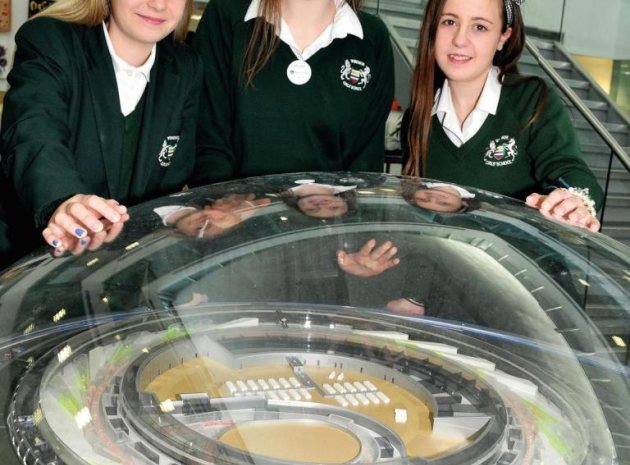If you’re a veteran of departmental field trips with your pupils you’ll know that no matter how great your lesson plans, how inspiring your classroom materials, or attentive your manner towards those who are struggling, the quickest route to an educational breakthroughs is often journeyed in a luridlyupholstered coach full of hyperactive kids. In fact, key findings in Ofsted research into learning outside the classroom concluded that, when well planned and executed, educational trips ‘significantly to raising standards and improving pupils’ personal, social and emotional development.’
The Association for Science Learning also points to compelling evidence that STEM fieldwork at secondary level engenders measurable benefits for pupils‘ motivation, cognitive skills and contextualising of complex issues. “With some experiences the impact isn’t necessarily felt at the time,” says Marianne Cutler, the organisation’s director of curriculum innovation. “But the work beforehand and after – revisiting and consolidating, looking at photos – can absolutely help children to have those lightbulb moments. If teachers prepare their students well before the visits and then afterwards, the learning can be consolidated. It helps give them a sense of why they’re learning about, for example forces involved in a rollercoaster, because they can see the application, and that’s positive.”
Ofsted concurs, its report concluding that learning outside the classroom is most effective when carefully woven into a wider framework of curriculum planning and firmly tethered to classroom activities. Visiting a working site can ramp up the benefits, at once delivering unforgettable curricular content, challenging students’ preconceptions of academia and industry, and opening their eyes to the career opportunities in a given field. Check out our favourite destinations for real-world science education adventures:
1. The synchotron
Diamond Light Source, Oxfordshire
There’s nothing like bombastic physics to bring much-needed ‘wows’ to the curriculum, and Oxfordshire’s whopping particle accelerator is a conceptual big hitter. “It’s often the scale that impresses,” says education office David Price of the ‘synchrotron’, which produces light ten billion times brighter than the sun and channels it into 29 beams of electrons used to study the atomic and chemical structures of tiny samples. “The particle accelerator sits in a concrete tunnel but that tunnel surrounds a room the size of five football pitches.” Bathing in the reflected glory of CERN, the site also sparks a little national pride. “A regular response is, ‘I didn’t know we were doing this stuff.’”
The precious ‘beamtime’ the accelerator generates is reserved for carefullyvetted researchers, but having toured and examined the ‘machine’ pupils can explore the ramifications of its workings for their own areas of study. “There are lots of things we do that connect with the curriculum at KS3 and 4,” says David. “For example waves and the electro-magnetic spectrum. Some exam boards cover the effect of electromagnets on electrons, which is essentially how we make the machine work.” What’s more, tours and workshops are often delivered by the scientists and engineers who work at the facility. “Talking to an engineer, not a guide, creates very positive feedback,” says David. “It’s important because they get to see what a scientist looks like. Rather than a caricature – a big white coat and glasses – they meet a real person.” Diamond.ac.uk
2. The theme park
Chessington World of Adventures, Surrey
The mind-boggling forces unleashed on rollercoaster rides has been brought into sharp focus in recent times, a timely reminder for physics students of the real-life applications of their textbook formulae. If an adventure park seems a frivolous destination then think again; the Theme Park Physics workshop at Chessington World of Adventures involves some serious calculations as groups explore the speed and energy efficiency of their favourite rides. “Looking at examples from around the theme park, pupils learn about forces, energy transfers and the calculations that are used to operate the rides,” says education team member Bryony Anderson. “They undertake team challenges based on the resort’s own rides that require them to interpret and use the calculations themselves.”
A post-workshop opportunity to experience the forces at play on each ride is a chance to indelibly mark your students’ memories with the concepts of force; how better to bring equations juggling acceleration, velocity, momentum and speed to life? “From the conversations our education team has had with teachers, the most valuable aspect from their perspective is that these workshops put examinable content into a relatable context,” says Bryony. “Identifying energy transfers through the journey of a rollercoaster, for example.” chessington.com
3. The observatory
Royal Observatory Edinburgh, Scotland
Home to the UK Astronomy Technology Centre and the Institute for Astronomy, this site in Edinburgh is the perfect destination if your lessons on the galaxies are less than glittering. The visitor centre boasts an enviable war chest of artefacts – including ancient astronomical documents, Apollo mission rock samples, and some stonking telescopes – to illustrate the timeline of galactic gazing. The site’s real coup de grace, however, is the interface it offers between school groups and the coalface of astronomical research. Workshops into galaxies and exoplanets allow pupils to grapple with real data from ongoing studies. What’s more, groups can tour the onsite labs; “KS3 and 4 pupils who visit are interested in speaking to experts,” says Matt Cook, public engagement officer at the observatory. “We have a wealth of scientists and engineers on site who are very happy to answer questions and talk about their work.”
Besides the opportunity to bump astronomical research into your pupils’ consciousness there are also important links to the curriculum. “GSCE astronomy is now a thing, and has its own equivalent up here in Scotland,” points out Matt. “We’re also covering transferrable skills: data handling, working with very big numbers and large timescales, considering sample size, studying data sets and understanding the scientific process. We try to be as cross-curricular as we can given that we’re a physics-heavy site. We also offer resources for teachers that tie closely to the curriculum and are based on work that has been, or is being, done here.” Helping students get a grasp on upto- date discoveries in deep space is a particular forte. “For example exoplanet activity – the world beyond our solar system – is being actively researched here, so we’re updating our information monthby- month.” Roe.ac.uk
About the author
Anna Blewett is a freelance journalist, who is always looking for new adventures.










